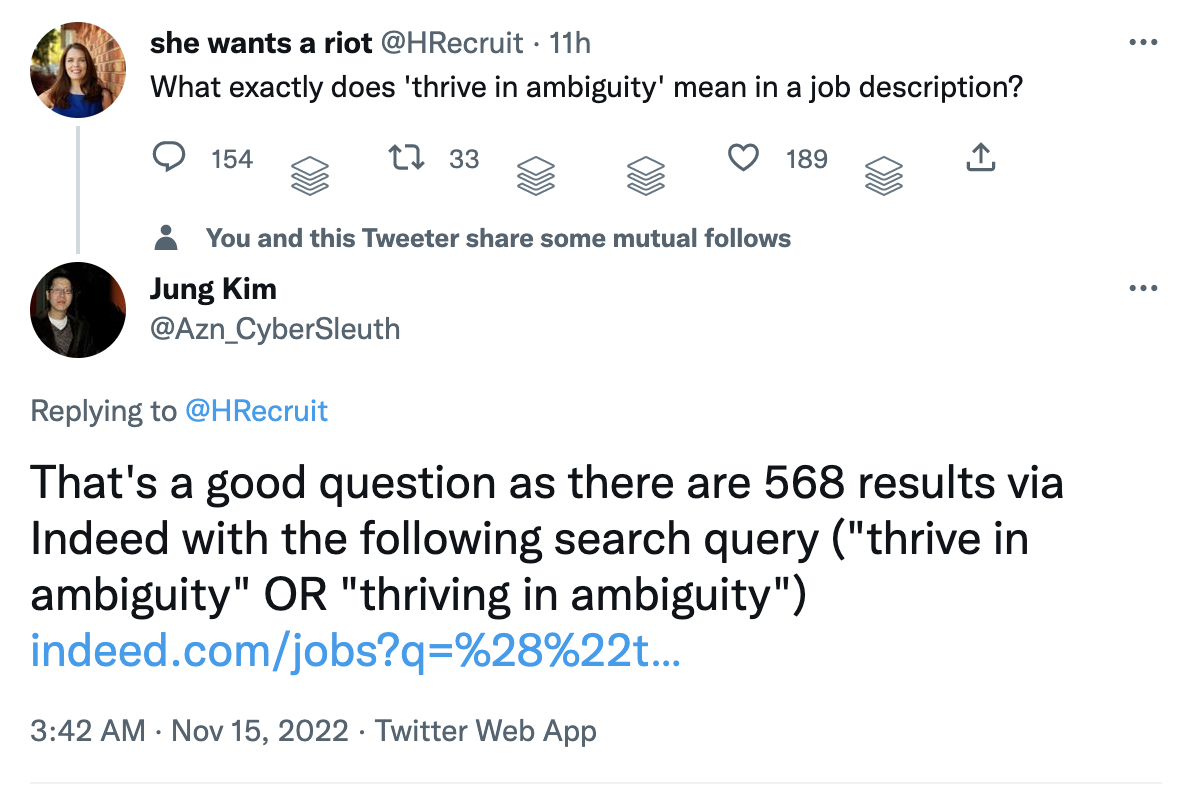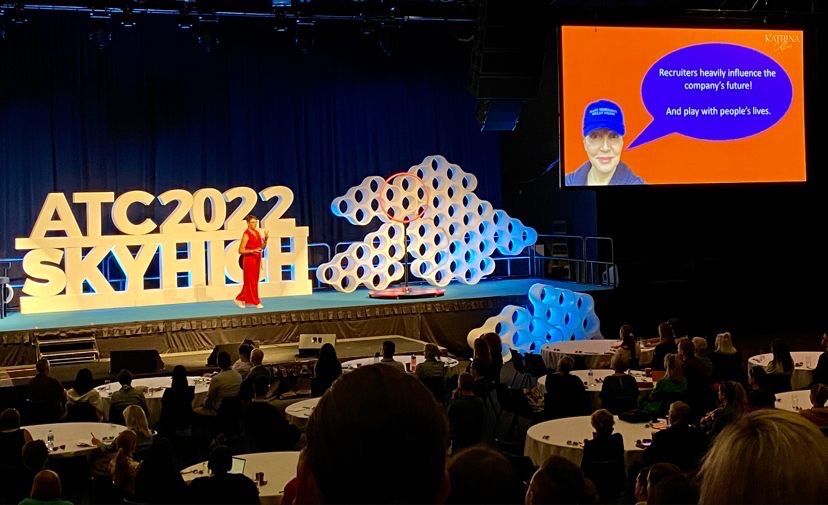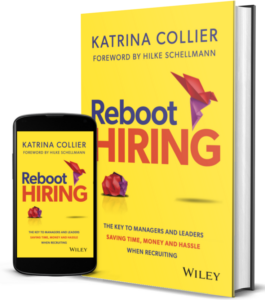Are we recruiting in ambiguity? Who knows!
My feed is full of layoffs. My feed is also full of new starters & job posts.
Is it possible that many companies over fired in 2020, over hired in 2021, and are recalibrating in 2022? 🤷 Not that that helps the humans on the rollercoaster that looks set to continue into 2023.
And when I was on stage in Sydney, I was hearing that Australian companies still can’t hire. Nobody is applying. Low unemployment. Struggle, struggle, struggle.
Which one is a true reflection of the global economy. F*ck knows. We’re recruiting or not, in a time of ambiguity!
“Thrive in ambiguity”
While pondering just how much company leaders seem to mess with people’s lives and livelihoods these days, I saw this below. (The whole thread deserves your attention)
Kristina is right… what is this madness?
The replies are fabulous. Ranging from ‘Run, Forest, Run!’ to ‘Stuff is a little in shambles, get ready for chaos.’ to a more serious, ‘For us it just means that you’ll ask questions and find answers vs everything getting handed to you in detail.’
Ignoring the fact that something that creates so much, erm, ambiguity shouldn’t be on a job description 🙄 my favourite is, ‘We’re flying the plane while building it.’ This could be the motto for what I sense is ahead for 2023.
And here are 2 skills you’re going to need to dig deep on to recruit in ambiguity… HUMAN skills!
Resilience
Gen Z & young Millennials, go find some Gen Xers. You’re going to need us. This one we have in bucket loads. Our generation has already been through several recessions & crashes. Plus Gen-X were the first to have two parents working and the highest rate of divorcing parents, so we are very self-reliant. Plus, we didn’t have tech in our hand so we migrated onto it… and I could go on but get yourself one as a mentor. Though we may be stressed and hiding it so be sure to be kind with their time. Enough of the gross generalisations…
This is a fab explanation of resilience, “Building resilience takes time, strength, and help from people around you; you’ll likely experience setbacks along the way. It depends on personal behaviours and skills (like self-esteem and communication skills), as well as external things (like social support and resources available to you). Being resilient does not mean that people don’t experience stress, emotional upheaval, and suffering. Demonstrating resilience includes working through emotional pain and suffering.”
I am not about to pretend I have the qualifications to advise you on how to build resilience – so get Googling and find articles that resonate with you! But I get through tough times by:
- finding the lesson or silver lining – there’s always one even when it feels like the world is imploding.
- phoning a friend – don’t hide the emotional rollercoaster you find yourself on. Don’t think everyone is having a great life, the pretence that is amplified by social media, because it simply isn’t true. Everyone has highs and lows, if we didn’t, we wouldn’t appreciate things when they are great.
- having gratitude for the tiniest things – my bed, the food in my fridge, snuggles from my dog, a hot shower, the shoes on my feet, laughing with friends, and so on.
- keeping track of successes and how far I’ve come – I refer you to this past article.
- Seeking help – I’ve worked with many coaches & spiritualists to get through tough times; investing in myself has always paid off. Consider joining my group mentoring space.
Again – this is how I do it. Find what works for you.
Influence!
Ok, really I want to call this pushing back because I am not seeing enough of it and you can not recruit in ambiguity, you mustn’t. It’s a common thread through my whole newsletter. There is so much data but use the data wrapped with emotion to influence.
Much of my presentation at ATC was about influencing hiring managers and being more proactive & strategic. For starters:
- Question more – e.g. If we put ‘thrive in ambiguity’ on the job description we create ambiguity, can we use words that are clearer to the reader? (Without pausing) What do you mean by it?
- Be more human – e.g. It’s interesting times out there, how likely is this position going to survive a downturn? Can we keep them through it? (Stolen from Elizabeth Lembke)
- Expect more – e.g. Every day this job is open costs the business x per day, so how are we going to partner to fill this role ASAP? (and deliver a great experience for all) If you don’t know how much it costs each day, ask your hiring manager.
- Show more – e.g. run a search during your intake/job briefing (Chapter 5) and let the hiring manager see the results so they start being realistic. And so on.
- Empathy – e.g. How many times are you approached by recruiters each week, [hiring manager]? Yes, applicants experience the same. In fact, I hear many are still interviewing even after offer because it’s so easy now. Let’s partner for success.
For too long the emphasis has been on tools and tech, which have their place in recruiting, but you’ll win when you combine them with the human-skills tech cannot replace. It’s time to refocus on developing your super-human skills.
And these were just two of them.



